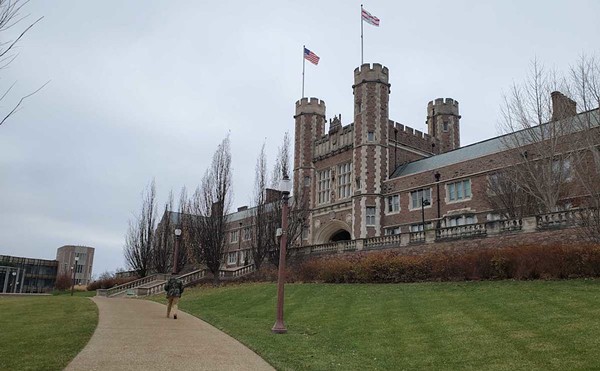TWA is back in the bankruptcy news. Place the newspaper over your nose and mouth, and continue to breathe normally.
With the announcement that TWA is about to assume its customary position in the federal courthouse -- this time on the hopeful note of an apparent acquisition by American Airlines -- it is once again white-knuckle time for the hometown airline's employees and customers. At RFT press time, more information was said to be coming on Wednesday from both airlines, but in the best case, months of uncertainty (regulatory and otherwise) lie ahead.
This will be the third time in 10 years that this presumed linchpin of St. Louis' economy has landed in bankruptcy court. They ought to swap names between the Trans World Dome and the Thomas F. Eagleton Federal Courthouse: Eagleton was, after all, instrumental in bringing the Rams to St. Louis, and the Trans World Federal Courthouse has a certain fitting ring to it.
Welcome back to the card game, St. Louis, the one in which you sit excitedly at the big-stakes table -- holding no cards.
By now, the community is accustomed to the turbulence of TWA. It was the only major airline to post consistent losses in the hundreds of millions during record years of economic prosperity, and it did so despite high marks for its on-time performance, frequent-flyer program, modernized fleet and even its Web site.
This paradox is more than a little unsettling, because it suggests a state of hopelessness no matter what TWA's "employee-owners" say or do. The airline has had no fewer than five CEOs since terrorist Carl Icahn's reign ended in 1993, and although it can be fairly argued that their golden parachutes and salaries were excessive, it's hard to imagine that all of them were incompetents who missed taking obvious steps to give the airline some magical simple fix it needed.
Instead, the consistency with which defeat has been snatched from the jaws of victory in good times suggests that TWA has little chance of survival on its own should the economy go south, no matter who is running the airline. Therefore the local pros and cons of an American buyout should be evaluated (as if St. Louis had a choice anyway) against the prospect of a dead or decimated TWA, not against the status quo.
In that context, the prospect of American's taking over TWA may be good news, for employees (albeit not all of them), air travelers, the business community and the city. Though the best-case scenario under American undoubtedly would mean some reduction in jobs, flights, revenues and civic self-esteem, it thoroughly trumps the prospect of some hubless doomsday.
Initial reports had American keeping intact all 20,000 jobs at TWA (an utterly implausible notion) and maintaining a bustling hub at Lambert International that would preserve much of TWA's nonstop service to more than 100 cities (more believable, given St. Louis' ideal location). Losing the airline's downtown headquarters seems likely, but even that is in the "unknown" column.
In any event, it's too early to know whether to feel sad or hopeful for TWA's oft-besieged workers, many of whom may be in line for increases in pay and benefits if the deal with American goes through. The employees' many concessions to management in the past decade have reportedly pushed them well below industry averages, in exchange for the joy of company ownership.
It would be a fitting irony if most TWA employees benefited from the company's demise while the man they so despise, Icahn, takes a deserved hit, through bankruptcy proceedings, in losing the sweetheart ticket-selling arrangement he received in exchange for a loan to the airline ["Gremlin on the Wing," Adam Pitluk, March 1, 2000]. TWA executives claim that Icahn's alleged abuse of the arrangement is one of their largest financial problems, and there's no doubt that Icahn's undeniable abuse of the airline and its employees over eight years is a legacy alive today.
That said, an even greater irony looms on the horizon, courtesy of the Washington-based Aviation Consumer Action Project. Paul Hudson, ACAP's executive director, criticized the proposed American-TWA deal on the grounds that it "would clearly reduce competition and increase concentration in the airline industry. There's already not enough competition on price."
Then Hudson added this: "This is going to be the first antitrust test of the incoming Bush administration."
Hmm. The Bush administration. Isn't that the one made possible by this unapologetic fellow Ralph Nader, founder of ACAP (and still prominent in its press releases)?
In case Messrs. Hudson and Nader need a hint, Bush has nominated one John Ashcroft to be his attorney general, directly responsible for antitrust decisions. Just last year, when Sen. John McCain (R-Arizona) proposed a nonbinding resolution in the Commerce Committee criticizing the proposed merger of United Airlines and U.S. Airways on consumer grounds, fellow Republican committee member Ashcroft voted no.
With or without Ashcroft, the Cheney-Bush administration seems unlikely to give a second thought to large mergers like the airline deals, just as was the case in the Reagan-Bush days. In general, that's dubious policy, one that calls into question the value of having deregulated airlines in the first place.
From the narrow perspective of St. Louis, though, TWA's proposed merger may be making the best of a bad situation. If the airline goes down without a partner, things will almost certainly be grave here.
With American in the mix, the local airline situation is upgraded to "uncertain."
At least we're used to that.





